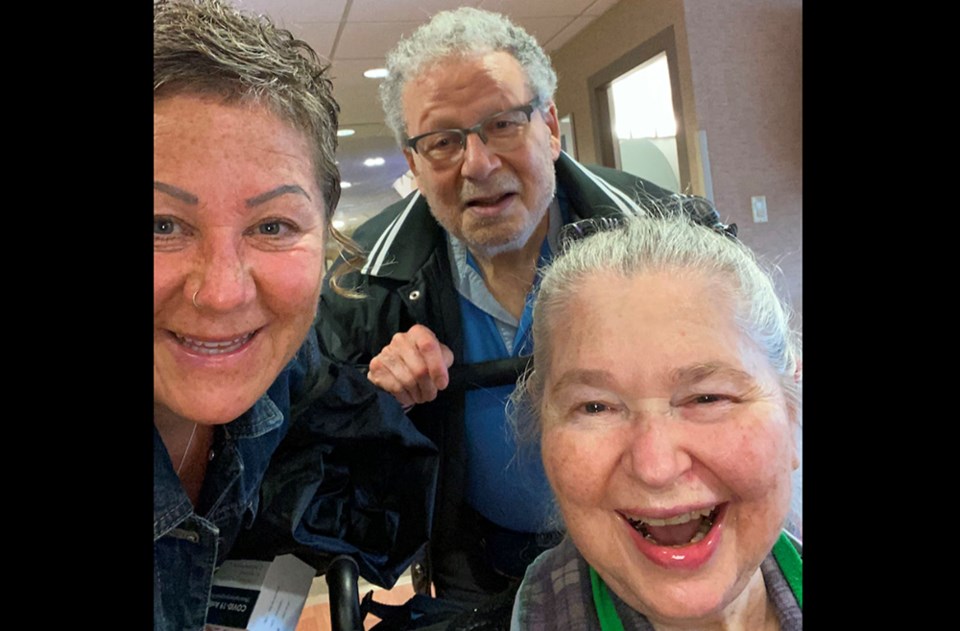A Port Moody woman says her father would have been spared a year of heartbreak and suffering if he was allowed to prescribe his own death in advance of his deteriorating health.
Selena Mclachlan said after her mother, Suzie London, was able to arrange for her own medical assistance in dying (MAID) in 2022, six years after she was initially diagnosed with frontal temporal semantic dementia with asphasia, and three years after she’d been confined to a wheelchair, her father, Mannie, inquired about making a similar provision for himself.
He was living with Lewy Body dementia, a form of dementia caused by abnormal clumps of a certain protein on the brain that diminishes memory, motor control and thinking — it’s the same disease that afflicted comedian Robin Williams but wasn’t diagnosed until after he died by suicide in 2014.
Mclachlan said her father knew his prognosis was not good. Having seen his life partner of 65 years choose her exit from her disease on her own terms, he wanted affirmation he could do the same.
But current laws in Canada don’t allow advance requests for MAID.
An e-petition authorized by Yukon Member of Parliament Brenda Hanley is trying to change that and an Ipos poll commissioned last year by the advocacy group Dying with Dignity found 82 per cent of respondents support advance requests for MAID for people diagnosed with an incurable condition, while 72 per cent support such requests even without a terminal diagnosis.
“As it stands today, people like my father would be faced with a very complicated process, in order to ensure the ability to give final consent before a MAID provision,” Mclachlan said.
MAID was legalized in Canada in 2016.
More than 31,000 people had chosen a medically assisted death by 2021, according to a government report published in July 2022.
But people requesting a medically-assisted death must meet several strict criteria, including being in an advanced state of decline that can’t be reversed and is causing them enduring and intolerable physical or psychological suffering.
Mclachlan said the nature of her father’s disease put him in a sort of Catch-22; he couldn’t file a request for MAID in advance while his health was still good and he enjoyed quality of life and by the time he was sick enough to be eligible, he’d no longer have the mental capacity to legally be able to make the request.
“People should be able to put their wishes in place while they are competent and then know that an advance request can move ahead when the time is right even if they are no longer competent at that point," a statement reads on Dying with Dignity's website.
Mclachlan said her experience with her mother showed the family the importance of being able to die with dignity.
“She picked the day, asked to have her hair done and wore her favourite outfit,” Mclachlan said of her mother’s medically-assisted death. “She was like a schoolgirl, giddy with excitement, waiting for ‘her day.’ It was beautiful, empowering and peaceful.”
But for Mannie, his death last October following a fall was anything but.
Before his tumble, he was still in reasonably good health, enjoyed quality of life. His spill, however, left him with multiple painful fractures including one in his neck and a brain bleed that ultimately led to his death.
Mclachlan said her father endured pain, suffering and anxiety.
“Had advanced request for MAID been an option, he would have liked to have one in place,” she said. “I feel like my dad was robbed of that choice.”
Mclachlan said while any change to existing MAID laws in Canada will come too late to help her father, she still has a stake in the battle.
According to Dr. Nathan Herrmann, a specialist in dementia at Toronto’s Sunnybrook Hospital, children in families where both parents have Alzheimer’s are five or six times more likely to develop the disease than someone who doesn’t have a family member with it.


.jpg;w=120;h=80;mode=crop)
